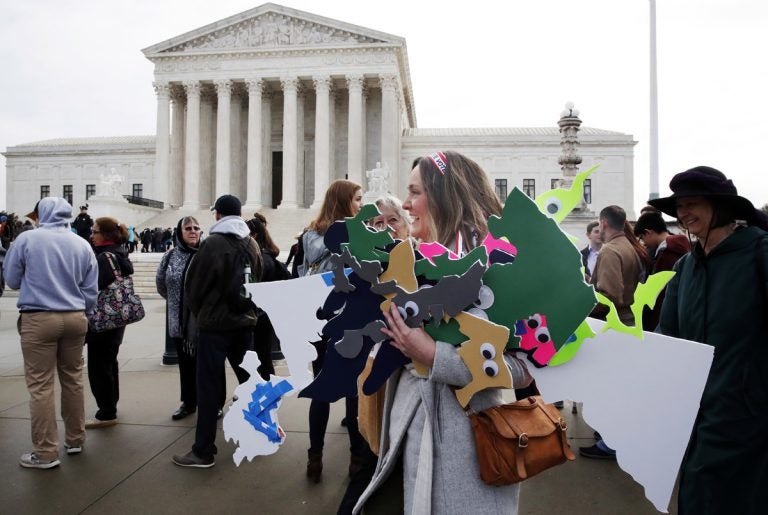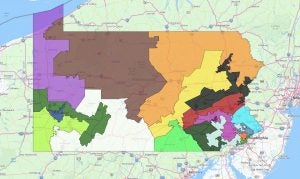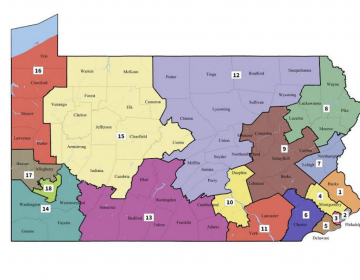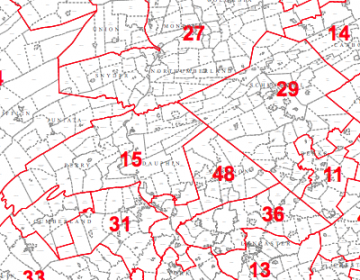Pa. congressional map unaffected by U.S. Supreme Court decision on partisan gerrymandering

Ashley Oleson, with the League of Women Voters of Maryland, carries signs of the state's districts, before oral arguments in the Supreme Court in March. (AP Photo/Jacquelyn Martin)
The U.S. Supreme Court was expected to make a defining decision on extreme partisan gerrymandering this term. It took up two cases, one from Wisconsin, and the other from Maryland. But, in unanimous decisions, the court avoided the key constitutional question at stake in these cases: How much politics is too much when determining voting districts?
Instead, it ruled on technicalities.
“It decided, effectively, it really wasn’t ready to answer the big questions and it got rid of both cases for the moment on procedural grounds,” said Justin Levitt, a professor at Loyola Law School. “Both cases will be back. Both cases can fix what the court said it didn’t like or wasn’t appropriate for the moment.”
In the main opinion of the Wisconsin case, Gill v. Whitford, the court ruled that plaintiffs were unable to prove standing or harm by the state’s redistricting plan and kicked the case back down to a three-judge panel in district court for further proceedings.
Chief Justice John Roberts wrote that “a plaintiff seeking relief in federal court must first demonstrate that he has standing to do so, including that he has ‘a personal stake in the outcome,’ distinct from a ‘generally available grievance about government.’” Roberts wrote the plaintiffs never followed up with “requisite proof” of harm, but gave them another chance at proving standing in the lower court.
In the Maryland case, Benisek v. Lamone, the court issued a temporary ruling reaffirming the lower court’s decision.
Neither ruling addressed the merits of the cases or whether there is a manageable standard for when partisan gerrymandering goes too far.
Attorney Mimi McKenzie had hoped the court would set a new federal standard.
“As someone who really cares about voting rights, I’m certainly disappointed because I was hoping that the Gill case would open up another way for voters to challenge partisan gerrymanders because not everyone has the body of law that we have in Pennsylvania,” said McKenzie, legal director at the Public Interest Law Center.
Pennsylvania has been embroiled in it’s own battle over partisan gerrymandering. Earlier this year the state Supreme Court ruled its congressional map violated the Pennsylvania constitution and ordered a new map before the 2018 midterm election.
McKenzie represents the plaintiffs in that case, and said she doesn’t expect Monday’s ruling to have an influence on their case.
“Since the U.S. Supreme Court is showing no interest in deciding once and for all whether partisan gerrymanders could violate the U.S. Constitution — no desire to decide that quickly — I’m really glad for the sake of Pennsylvania voters that we pursued their rights in state court,” said McKenzie.
She added that in the Pennsylvania case, they had plaintiffs from all of the state’s 18 congressional districts that were challenging both their individual districts as well as the statewide map and many of them testified about the harm that was caused because of it.
“Even though the standings of our voters wasn’t being challenged, we put on an abundance of evidence about the various types of harm,” said McKenzie.
Levitt says the hesitation from the U.S. Supreme Court, makes the decision from the Pennsylvania court more impactful.
“The longer it [the U.S. Supreme Court] delays, the longer it punts, the more important it is for state courts to decide these cases under state constitutional law. That’s exactly what the Pennsylvania Supreme Court did,” said Levitt. “I think the punts today by the U.S. Supreme Court will cause other courts in other states to look to their own state law to see if they can fix the problem that the U.S. Supreme Court doesn’t seem willing to fix yet.”
Russell Wheeler, a visiting fellow of governance studies at the Brookings Institution, agrees that today’s ruling from the U.S. Supreme Court will have no bearing on Pennsylvania’s new congressional map.
But he says that doesn’t mean there won’t be consequences.
“State legislatures remain free to indulge in extreme partisan gerrymandering without fear of [U.S.] Supreme Court intervention at least until the Court says — which it may never — that some partisan gerrymandering is so partisan as to violate the First Amendment and/or the Equal Protection Clause.”
In Pennsylvania, top Republican lawmakers who were defendants in the case have until next week to appeal the decision before the U.S. Supreme Court.
WHYY is your source for fact-based, in-depth journalism and information. As a nonprofit organization, we rely on financial support from readers like you. Please give today.







